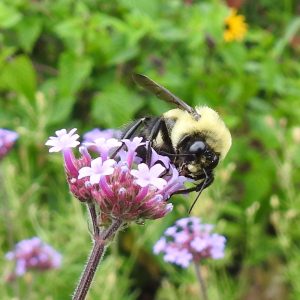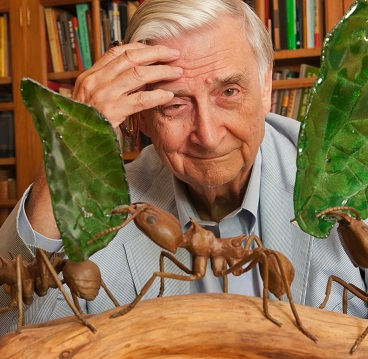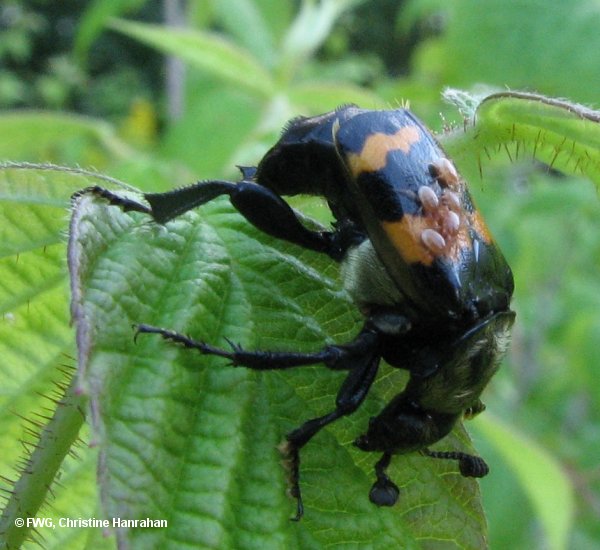by Renate Sander-Regier
 Pollinating insects are easy to love. Their activities contribute to producing the food we eat and to beautifying our gardens.
Pollinating insects are easy to love. Their activities contribute to producing the food we eat and to beautifying our gardens.
Pollination also helps to sustain plant diversity and food webs in natural ecosystems, which in turn support a host of other essential natural processes – all things being interconnected. The planet would be a very different place without the hard work performed by insect pollinators and other pollinating organisms.
If we zoom out to consider all insects, the planet would be even more different without all their hard work. Insects perform a wide diversity of important functions beyond pollination.
“The little things that run the world”
In a 1987 speech, the late E.O. Wilson – internationally renowned ecologist, naturalist, writer and biologist-entomologist specializing in ants, and insect champion – called insects/invertebrates the “little things that run the world” (transcript of full speech). In the same speech, he says
“The truth is that we need invertebrates but they don’t need us. If human beings were to disappear tomorrow, the world would go on with little change. Gaia, the totality of life on Earth, would set about healing itself and return to the rich environmental states of a few thousand years ago. But if invertebrates were to disappear, I doubt that the human species could last more than a few months.”
That is because insects, in their astounding and glorious diversity, play a multitude of vital roles in the natural systems and processes that make the world go around. The functions are too numerous and nuanced to include in one blog post. But many sources emphasize certain roles, so let’s have a look at the “top 5”:
- Insects pollinate flowering plants, vines, shrubs and trees to help them reproduce. As already mentioned, pollination contributes to producing food (e.g. berries, stone fruit, nuts) needed by humanity and by many other living organisms. The world would be a poorer place, nutritionally and otherwise, without pollination.
- Insects also provide food directly to countless other organisms. Fish, reptiles, amphibians, birds and mammals, including people, all eat insects, which offer a rich source of protein, vitamins and minerals. If you are swatting mosquitoes at this time of year, it may be comforting to know that they are an important food source to diverse wildlife species, and they pollinate too!

Adult male American Redstart carrying multiple insects, a sign that it’s feeding young. Photo by Christopher Clunas.
- Many insects are also predators who eat other organisms. In certain contexts, we welcome predation (also parasitism) by “beneficial insects” who help to control what we consider to be “harmful organisms” or “pests” in gardens, agricultural fields, and other places of human activity. Spiders are considered by some to be the most important predators in the insect world, as well as substantial food sources for other organisms.

Shamrock orb weaver, Araneus trifolium. This spider has several prey species, including a hover fly. Photo by Christine Hanrahan.
- Other insects eat dead animals and plants, as well as other biological remains, thereby contributing to decomposition – a natural process we don’t talk about much, but one that is necessary to life on this planet. Many insects, along with a wide diversity of other organisms, are involved breaking raw organic remnants into simpler compounds and nutrient-rich organic matter that supports the growth of new organisms. It is a natural clean-up and recycling process, complex and necessary to natural processes on this planet. It also supports re-wilding projects!
- The final “top 5” role involves insects in seed dispersal, another important aspect of plant reproduction. Ants are the superstars in this process. There’s even a specific term for the contribution they make: “myrmecochory,” which is essential to the regeneration of spring ephemeral flowers in woodlands.
That is a quick look at some of the essential and interconnected roles played by insects on this planet. They really do make critical contributions to natural systems and processes. Links below offer more information if you are curious.
Another insect champion
Doug Tallamy, who teaches entomology and wildlife ecology at the University of Delaware, has become a significant champion of insects in recent decades. His work underscores the interconnectedness of all life on this planet, and the vital roles of often overlooked and underappreciated beings like insects and native plants.

Screen shot from Doug Tallamy’s presentation: A guide to restoring the little things that run the world
He has published fascinating and important books on the topic, and co-founded a related initiative called “Homegrown National Park” (scroll down for his books). Doug is also a generous and dynamic speaker. In his talks, he conveys important and compelling arguments in favour of making human-dominated landscapes welcoming to wild things, and of helping nature to thrive in those places. He stresses that every space counts, no matter how small.
Doug also shares surprising statistics and fascinating information – like the significance of humble caterpillars to healthy ecosystems, and the vast expanses of land under private ownership, which offers enormous potential to makes critical contributions to nature conservation.
The advice Doug offers is clear and practical – like 3 essential activities for encouraging nature:
- reduce the size of lawns
- plant more native species
- remove invasive species
… to help landscapes, large or small, fulfill 4 ecological responsibilities:
- support food webs
- sequester carbon
- clean and manage water
- support pollinators.
Doug emphasizes that each of us has the power and responsibility to take action on our own land, or to help someone on their land, and that is urgent to act because it is the wild things that keep us alive.
Many of Doug Tallamy’s excellent presentations are available online, and you can find lots if you explore. Here are a couple of recent talks, one shorter, one longer:
Stay tuned for “Beyond pollinators 2.”
Learn more
Pollination – importance
- The importance of pollinators (Promote Pollinators)
- The why, what, when, where, who, how of pollination (Smithsonian Gardens)
- Why is pollination important? (US Department of Agriculture)
- FAO’s global action on pollination services for sustainable agriculture (UN Food and Agriculture Organization)
E.O. Wilson
- E.O. Wilson’s lifelong passion for ants helped him teach humans about how to live sustainably with nature (The Conversation)
- E.O. Wilson: American biologist (Britannica)
- E.O. Wilson, ‘Darwin’s natural heir,’ dies at age 92 (National Geographic)
The little things that run the world
- The little things that run the world (Earthwise Aware)
- The little things that run the city (RMIT Centre for Urban Research)
- We are losing the “Little things that run the world” (UNEP)
- Doug Tallamy: a guide to restoring the little things that run the world
- The little things that run the world (trailer for a film in progress)
What insects do for the world
- What is the importance of insects in the ecosystem? (World Atlas)
- Beneficial insect (Canadian Encyclopedia)
- Why do we need bugs (Almanac)
- The importance of insects in the web of life (Mother Earth News)
- Ecosystem services of insects (Encyclopedia of Social Insects)
- The economic value of ecological services provided by insects (BioScience)
- Decomposer insects (Centro Iberoamericano de la Biodiversidad)
Renate Sander-Regier teaches Environmental Studies at the University of Ottawa. At her home in rural West Quebec, she cultivates wild tangles to welcome her wild little neighbours and help them thrive.


